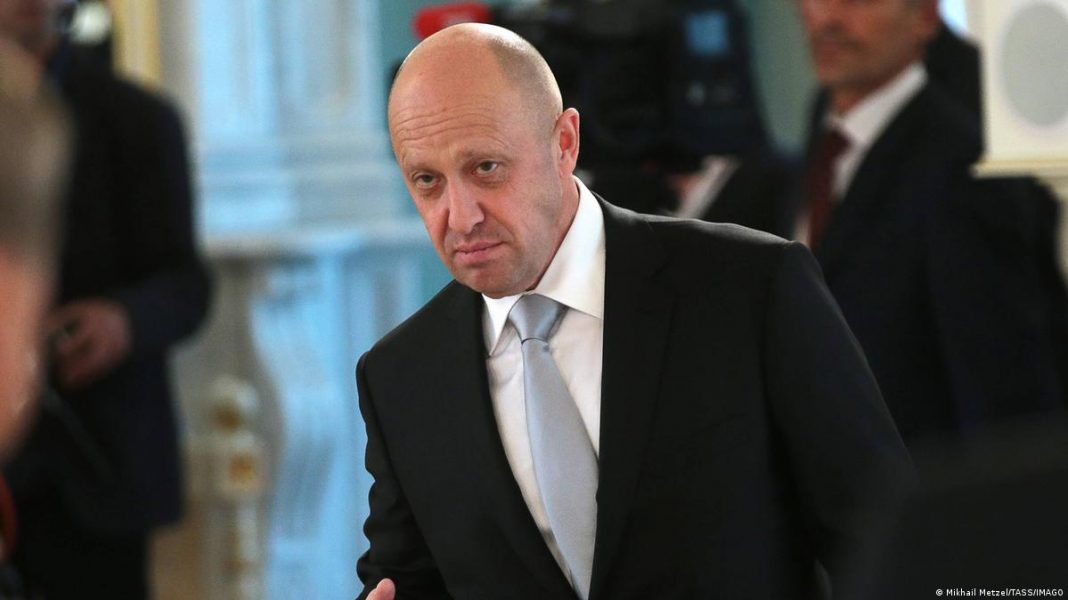Yevgeny Viktorovich Prigozhin was born in Leningrad on June 1, 1961. There is no information about his father, who died when Eugene was seven. “My father died early, and my mother worked in a hospital. Not in leadership positions. Plus, we had a grandma. Thus, together with a sick great-grandmother, we had to survive for a rouble and a half per day,” later recalled Prigozhin. His mother, Violetta Kirovna (born December 1, 1939), was an infectious disease specialist, later defended her PhD thesis, and was working as a professor. Now she is a successful businesswoman, the owner of the Concord construction company, which built the elite residential complex Northern Versailles in the Lakhta district, St. Petersburg, as well as the Lakhtapark residential complex for 490 apartments and 60 cottages, and the Lakhta-Plaza hotel complex. He is fond of art and collects paintings. Yevgeny was raised by his stepfather, ski instructor Samuil Zharkoy.
In 1977, Yevgeny graduated from the sports boarding school No. 62 (now the College of the Olympic Reserve No. 1). He was engaged in cross-country skiing, to which his stepfather was addicted. “We rolled in a day, sometimes 50 km. Alone with myself, I can go very long distances,” said Prigozhin in the only interview with the St. Petersburg magazine City 812. He studied alongside such celebrities of Soviet sports as swimmer Vladimir Salnikov and three-time Olympic champion gymnast Alexander Dityatin.
This Content Is Only For Subscribers
After graduating from school, he entered the Leningrad Chemical and Pharmaceutical Institute, majoring in pharmacist. However, after two courses of study, he was expelled due to a law violation and falling into law enforcement agencies’ field of view (“I have an unfinished chemistry degree. The degree of scientific suitability is an ignoramus”).
On November 29, 1979, the Kuibyshev Court in Leningrad sentenced Prigozhin to the first suspended sentence because of a robbery. According to the Soviet Union laws, a conditionally convicted person could be called to work in places determined by the bodies in charge of the execution of the sentence. Consequently, Prigozhin was sent to Novgorod and settled in a dormitory on Leningradskaya Street, 62. “At one time, there was a hostel for “conditional workers”. Those who lived there were sent to work in “chemistry” – that is, in a chemical plant. Now the hostel is no longer there; it ceased to exist in the 90s, immediately after the collapse of the Soviet Union. Now the tax office is located in this house,” reported a source, who is familiar with the situation.
In 1980, Prigozhin ended up in Leningrad, where he met a local resident Alexei Bushman. Unfortunately, Bushman and Prigozhin were joined by three more – a previously convicted native of the Bryansk region Valentina Makeko and two minors from Chelyabinsk. In February 1980, Bushman and Prigozhin broke into an apartment in one of the houses on Maclin Prospekt [Avenue – ed.] (now English Prospekt) and stole the property of citizen Osipov in the amount of 177 rubles. The prey of the thieves was: a vase, a candy bowl, a napkin holder, six glasses, six wine glasses, six vodka glasses and two horns.
On March 1, the drunken Prigogin went to work on his own. At night, he squeezed glass into the apartment of one of the houses on Ropshinsky Street, where the Telitsin family lived. The theft was prevented by a local, who saw how the young man leaned on the windowsill of the first floor – the woman made a noise, and Prigozhin was forced to retreat.
On March 20, 1980, Prigozhin, Bushman, and Makeko noticed a previously unknown girl in a beautiful coat in the wardrobe of the Ocean restaurant. “Prigozhin offered to rob this girl. As later established – the Koroleva,” the case file says.
Bushman told the investigator: “Prigozhin grabbed Koroleva by the neck and dragged her out of the street. On the lawn, Prigozhin knocked her down. I ran up and started taking off her boots. But I didn’t take off the earrings. Prigozhin could have done it.”
On October 6, 1981, the Zhdanovsky People’s District Court of Leningrad gave its verdict. According to Judge Abramova, the accused Prigozhin, Makeko, and Bushman did not take the path of correction.
“Prigozhin arbitrarily left the area where he was sent to serve his sentence to the construction site of the national economy,” the verdict says. Yevgeny Prigozhin was found guilty under the articles “theft”, “fraud”, “involvement of a minor in criminal activity”, and “robbery” of the Criminal Code of the RSFSR and sentenced to 12 years in prison, adding a previously unserved sentence. In total – 13 years in a high-security colony without exile and confiscation of property.
Prigozhine was sentenced to only nine of the 12 years in the colony. In 1988 he was pardoned, and in 1989, he left the colony settlement. In 1989, Prigozhin received another term for involving minors in prostitution. However, he managed to close the case very quickly.
After returning to Leningrad, he went into business.
“In 1990, at Aprashka [local neighbourhood- ed.], I was the first in Leningrad to start selling hot dogs. Mustard was kneaded in my apartment – in the kitchen; my mother counted the proceeds there – I earned $ 1,000 a month, which were mountains of rubles. It was difficult for my mother to count. In 1991, at the American consulate, I filled out a questionnaire, answering questions, literally: “Answer honestly, did you cooperate with the KGB, were you engaged in prostitution, selling drugs.” I answered – I sell hot dogs. So they ran to see me,” recalled Prigozhin.
In 1995, Prigozhin opened the Wine Club bar shop on Vasilyevsky Island [a neighbourhood in St. Petersburg (ex-Leningrad) – ed]. Then, in December 1996, with partners, he opened the first elite restaurant in St. Petersburg, “Old Customs”, opposite the Kunstkamera. The $350,000 invested returned five months later, and by the end of the year, the first million dollars had been earned.
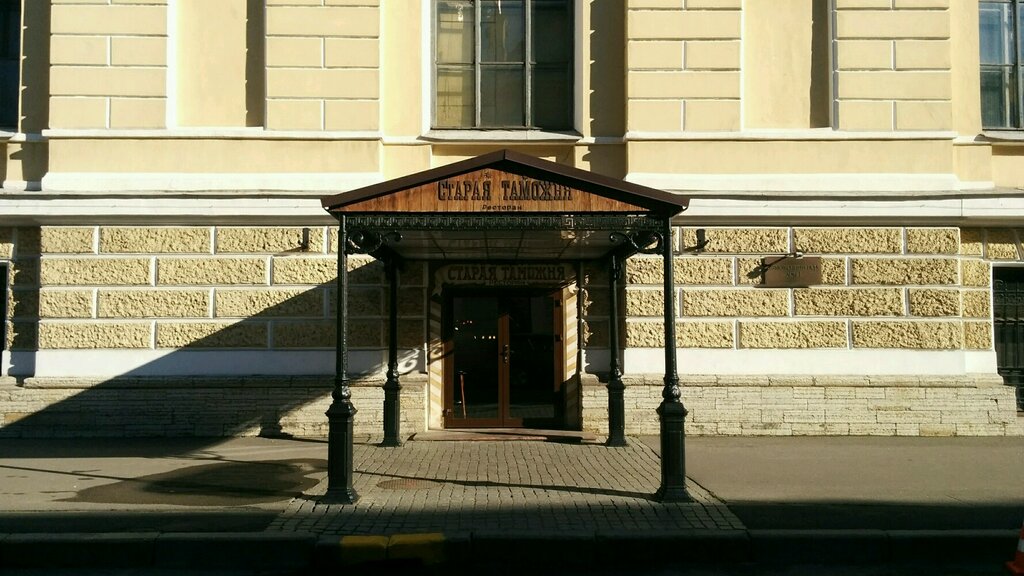
In 1996, he opened a catering business – the Concord Catering Company.
“When I decided to take up the industrial scale, I made an offer to Matvienko, but she refused. So I went to Beglov, he to Medvedev, he to Putin. It wasn’t yesterday. Included school meals in the national project. I drank a lot at endless meetings with Dvorkovich, spent a million and not rubles in vain with the Germans, and realised that the project exceeded my initial romantic 10 million euros. Vneshtorgbank gave a loan”.
He does not hide the fact that at that time, he had to deal with criminals:
“It started with sausages. From each stall he paid 100 dollars to bandits, like all cooperators. It’s funny to remember – some “red-faced” from the “Malyshevsky “criminals. But when in 1995 he opened the restaurant “Old Customs”, and the European nobility began to visit it, even Feoktistov did not swear there. He somehow began to be rude out of habit; I came up, gently took his hand and asked [to stop]. But Misha Mirilashvili hurt as much as he could. Finally, shortly before his arrest, he explained to me why I should gift him the “Customs”: “We have everything in chocolate – now our man has become president.” Many clownery worked at that time. By the way, then Volodya Sych helped me. It’s fun to remember now. Those times… Today, in the global catering field, the game rules are just emerging. It’s also difficult.”
In the spring of 1998, Prigozhin opened the New Island restaurant, which has become a popular destination for the financial and political elite. In the summer of 1999, Sergey Stepashin and IMF Managing Director Michel Camdessus met there; in 2001, on board, the New Island, hosted a dinner for Russian and French Presidents Vladimir Putin and Jacques Chirac. Here, in May 2002, Vladimir Putin welcomed George W. Bush, and in the fall of 2003, Putin celebrated his birthday on the ship.

“Vladimir Putin saw how I did a business out of a stall. I saw how I do not disdain to personally bring a plate to the crowned persons because they came to visit me. We met when he arrived with Japanese Prime Minister Mori, then with Bush. And before that, Sergei Stepashin met with Camdessus, the President of the International Monetary Fund. In my presence, Yeltsin called Stepashin and said: “Seryozha, don’t come back without a loan.” And I tried with might and main,” recalled Prigozhin.
It was then that Prigozhin got the nickname “Putin’s Chef”. True, Vladimir Putin himself, answering a question about Prigozhin, denied the information that Prigozhin was one of his friends and joked about the cook: “All my cooks are employees of the Federal Security Service.” “He is not my friend. I know this person, but he is not on my friends list. He may have different interests. We do not support him, but we do not interfere,” Putin said.
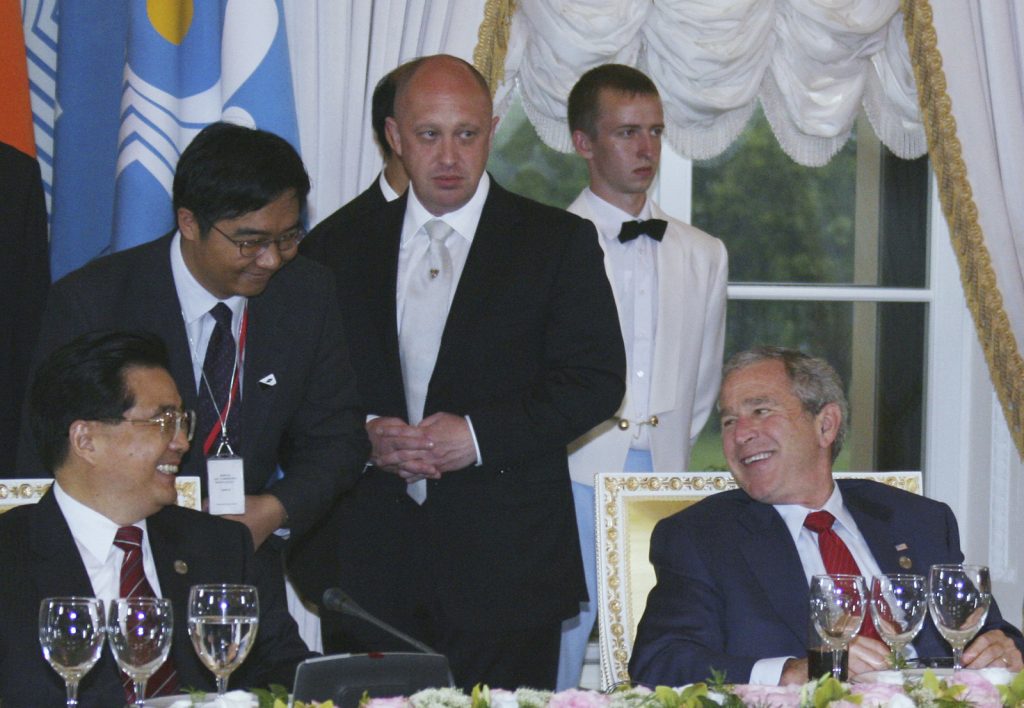
In 2018, Vladimir Putin, in an interview with foreign journalists (Megyn Kelly from NBC and Armin Wolf from ORF), again revealed his acquaintance with the entrepreneur (but not friendship) and denied his connection with the state, comparing Yevgeny Prigozhin with the American entrepreneur George Soros:
“I ask you to make a difference between the government of the Russian Federation, the Russian state, Russian citizens or some legal entities, maybe. You just said that Mr Prigozhin is called Putin’s chef. He is engaged in the restaurant business; this is his economic base; he is a restaurateur in St. Petersburg. But now I want to ask you: do you really think that a person who is in the restaurant business, even having some kind of hacking capabilities, having some private company in this area – I don’t even know what he does – from these statuses can affect elections in the United States or some European country? How low everything has fallen in the Western countries, and what happens in the information and political areas if a restaurateur from Russia can influence elections in some European country or the United States! Isn’t it humorous? The Russian state has nothing to do with this… In the United States, a defendant, Mr Soros, interferes in all affairs worldwide. And very often, our American friends say to me: America has nothing to do with this as a state. Now there are rumours that Mr Soros wants to rock the European currency. This is already being discussed in expert circles. Ask the State Department: “Why is he doing this?” The State Department will answer you that it has nothing to do with this; this is a personal matter of Mr Soros. And with us, this is a personal matter of Mr. Prigozhin.”
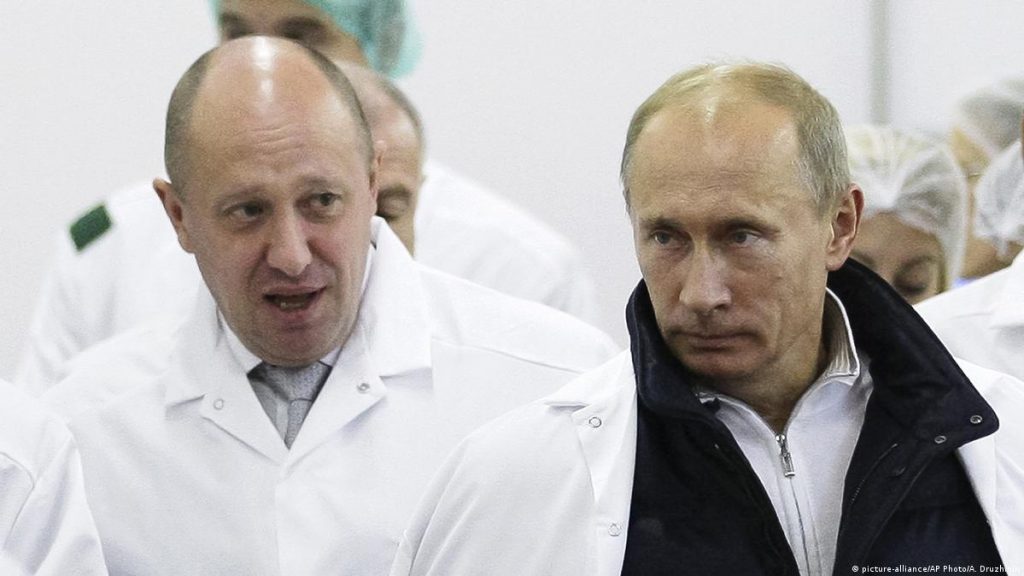
Since 2000, Prigozhin has been involved in construction projects. In addition to the shares of the Concord company and objects in Lakhta (mentioned above) registered to his mother, Violetta Kirovna, Prigozhin initiated the construction of several other objects. In 2011, Concord received permission to build a “medical rehabilitation centre” with an area of about 56,000 m². In 2015, the company commissioned 18 three-story buildings for 490 apartments, 60 three-story cottages, a SPA centre with a fitness area and a restaurant. It is worth noting that according to Ascolta, the former head of the Federal Security Service of the Russian Federation, Evgeny Murov, also stood at the origins of the Concord company.
In July 2015, RBC reported that from the end of 2014 to mid-2015, Concorde-related companies won tenders for 10.3 billion rubles for cleaning the barracks and educational institutions of the Ministry of Defense.
Megaline, a company associated with Prigozhin, received a contract for 3.3 billion rubles and has been building a military base in Valuyki, Belgorod Region, since September 2015. In addition, the same company won a tender for a pre-fabricated military camp for 161.6 million rubles in the village of Svetly in the Omsk region.
In the fall of 2015, some companies believed to be connected to Concorde won tenders issued by a Defense Ministry subsidiary. According to the contract, the companies must take over housing and communal services for military camps in the Moscow, Bryansk and Tver regions for 26 billion rubles.
According to RBC, in 2015, all companies associated with Yevgeny Prigozhin received contracts from the Ministry of Defense for catering, cleaning and construction services worth 68.6 billion rubles in total.
Since 2010, the company, owned by the wife of Yevgeny Prigozhin, has been renting the House of the Eliseev Brothers trade partnership. After reconstruction, it housed the Eliseev Merchants’ Shop. In the summer of 2016, the company won the right to privatise the building for 740 million rubles.
From 2002 to 2012, Prigozhin managed the fast-food chain “Blin! Donalds “[a paronymy; can be interpreted as Pancake! Donalds or Damn! Donald’s – ed]. The opening of one of the restaurants in 2003 was attended by St. Petersburg Governor Vladimir Yakovlev and Chilean President Ricardo Lagos. The network was aimed at the general population, offering “Russian fast food “, including the “kvadrososison “[a burger with sausages instead of cutlet – ed.], and by 2008 had grown to 10 locations, serving as the basis for Prigozhin’s creation of the format of a food factory. True, the media repeatedly pointed out violations of the law: minors worked in Prigozhin’s chain, who also poured low-alcohol drinks.
Next, Prigozhin took up children’s school meals – a topic that is relevant to him to this day.
“In 2005, for ten years, I had the largest field service company in Russia – all the G8s, the summits were served by us. Then I decided and chose a couple of schools on Vasilyevsky Island – the 10th and 18th – and tried it. Of course, this was not a business. I began to feed schoolchildren with food sets in sealed packaging. We organised modern compact kitchens in schools – everything fitted on six square meters. At the same time, I researched the topic in detail. School means children, teachers, and parents. You can understand a lot if you satisfy such a tangle of interests. I was seriously engaged; for example, I agreed with the Department of Children’s Dietetics of the Mechnikov Institute and received results in six months that children began to get sick less, even with specific diseases, like acute respiratory infections. Dynamics in other indicators were also surprisingly positive. I don’t mention hundreds of thanks from parents for the fact that I devoured the recommended seaweed salads. Then I monitored the intestinal well-being of the children. So: every day, an average of 50 children with acute enterocolitis, that is, abdominal pain, turn to polyclinics and hospitals in St. Petersburg. But there are no statistics on schools – neither schools, doctors, nor municipal authorities benefit,” said Prigozhin.
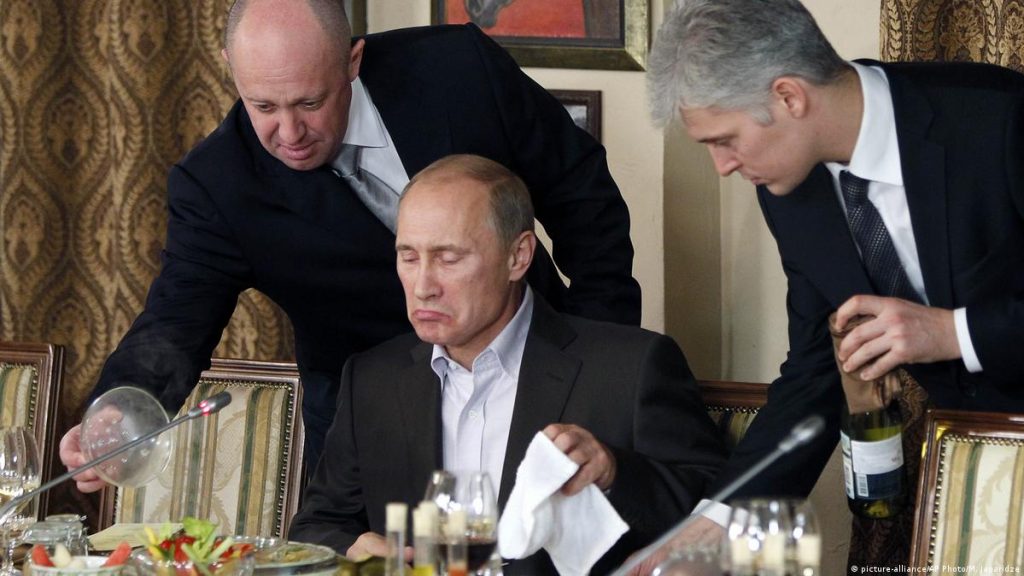
Later, 711 lawsuits were filed against Yevgeny Prigozhin’s firms by angry parents claiming their children were fed food “with worms, cockroaches, human hair, plastic bags, staphylococcus aureus, salmonella and E. coli”. It also turned out that Prigozhin received 140 billion rubles (more than $2 billion) from the Moscow budget to supply food to Moscow schools. Approximately the same amount appeared in Leningrad. Prigozhin cashed money through Concorde, Shkolnik Yuz, Social Nutrition Center and ten more of his companies.
In June 2012, an unpleasant story happened in St. Petersburg: a week before the start of the International Economic Forum, the catering company Caramel, which was supposed to feed the staff, was closed by Rospotrebnadzor [Russian authority responsible for the supervision of consumer rights protection and human well-being – ed.]. The reason was the poisoning of six people at a banquet.
Ziminov, Prigozhin’s business partner, was the head of Caramel. They started a business together in the early 1990s when Prigozhin returned home after his second prison term. Together they founded several companies, and in 1997 they registered Concord Management and Consulting. The friendship was such that Ziminov bought an apartment at the same entrance as Prigozhin on Zheleznovodskaya Street. Then, in 2004, Prigozhin asked a friend to sell his stake in the business. As Forbes wrote, out of the promised million dollars, he paid 600 thousand, and then somehow it turned out that an inspection came to Ziminov’s remaining firms and closed them for working without cash registers. So Prigozhin’s friend had to start the business over again. But Caramel Catering has grown to a company that won tenders for servicing international receptions, banquets of Sberbank and other large clients (later, the company’s ownership changed, but Ziminov remained the head).
As Andrei Mikhailov, a former employee of Prigozhin’s empire, said, in the spring of 2012, Prigozhin’s head of security in St. Petersburg instructed him to “do something about Kirill Ziminov and his company Caramel Catering”.
It was necessary, Mikhailov said, “to make sure that people from business, the press, come to the event served by Ziminov, and that someone “gets sick” there.
Mikhailov arranged a round table, “Prospects for the development of entrepreneurship”; the organisation was entrusted to “Karamel”, and during the banquet, six specially hired “entrepreneurs” feigned poisoning. The services of an ambulance that came to the restaurant on call and made the correct diagnoses were also paid for. Caramel tried challenging the suspension of work in arbitration, but the forum began before the courts were over.
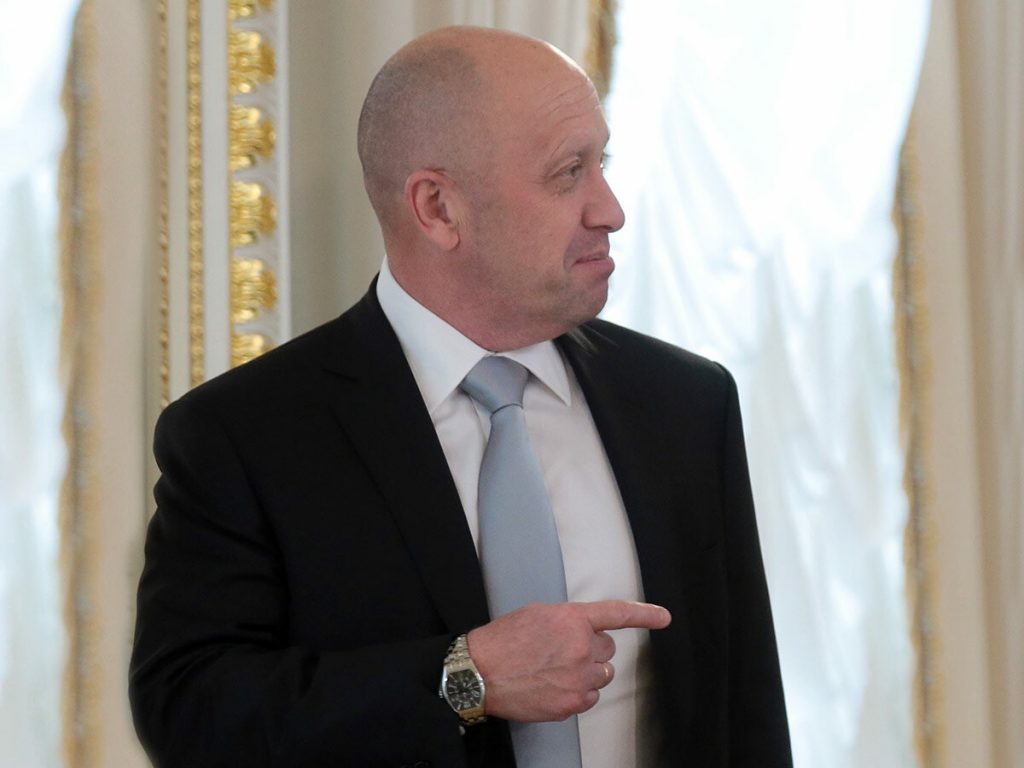
Starting in 2011, Prigozhin began to invest in founding private military companies (PMCs), following the example of the American Blackwater Eric Prince. This private army does not exist; it is neither in the lists of power structures nor in the registers of legal entities. However, the Wagner PMC has armoured vehicles and heavy infantry weapons despite this. The unit has been involved in the Syrian conflict since 2013; it was involved in the return of Crimea and then transferred to the temporarily occupied territory of the Lugansk Oblast (Ukraine) and the Central African Republic. According to the latest data, a group of persons belonging to the Wagner PMC have been on the territory of Venezuela since the beginning of 2020.
The Wagner PMC takes its name from the call sign used by its commander, Dmitry Utkin. Dmitriy Valerievich Utkin, “Wagner “, born in 1970, a native of Kirovohrad, Ukraine. He got busy with mercenary activities after being fired as positions commander of the 700th individual detachment spetsnaz of the 2nd individual brigade special destination of the GRU, located in Pechory, Pskov region. A copy of his retirement report is available on the Internet. There is no confirmation of its authenticity or denials. In 2016 Utkin was seen on special admission in Kremlin for militaries who demonstrated extraordinary heroism. In June 2017, Utkin was put under US sanctions. The American Ministry of Finance list states: “Bound with private military company Wagner “. He is a big fan of the Third Reich and Nazism (hence the call sign “Wagner” – Hitler’s favourite composer).
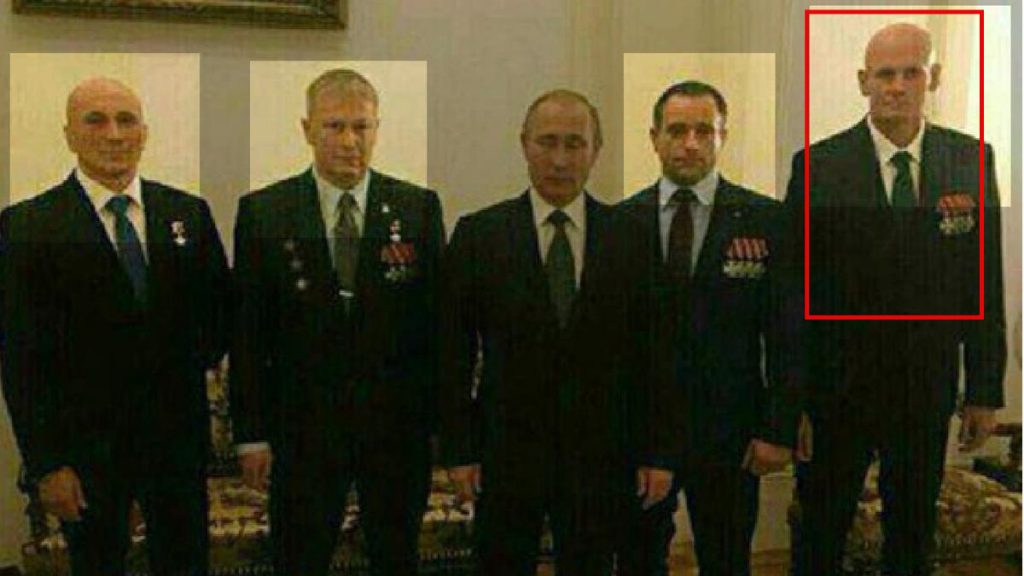
On February 7, 2018, the most scandalous defeat of Wagner took place in Syria: trying to recapture an oil refinery near the city of Deir ez-Zor from American soldiers, the PMC suffered enormous losses in a night battle, measured from 200 to 600 militants. At the same time, the Russian troops stationed at the Khmeimim base did not come to the rescue: Putin made it clear that the activities of PMCs are a private initiative of Prigozhin. The Pentagon expected that the defeat would be followed by the activation of the Russian military in the region, and the massacre near Deir ez-Zor would provoke a serious international conflict. That did not happen.
At the same time, it became known that Prigozhin had a keen interest in the region. Prigozhin’s companies “Velada” and “Mercury” received state contracts to extract 250 billion m3 of Syrian oil. In addition, the EuroPolyus company signed an agreement on oil fields with the Syrian government. In it, Prigozhin promised the Syrians, in exchange for oil, “to liberate their territories and ensure their security.” Some experts believe that it was this contract that underlay the adventure near Deir ez-Zor.
Prigozhin quickly restocked the personnel of the PMC at the expense of militants who had a “fire baptism” in Donbas and simply by encouraging volunteering. Moreover, it expanded its activities to other regions, particularly Africa.
At the end of 2019, the commander of PMC Wagner, Dmitry Utkin, was appointed CEO of Prigozhin’s company Concord Management and Consulting. The structure controls the “River Palace “motor ship, restaurants “Russian Empire “, “Russian Kitsch “, “Polenta “, and boutiques “Museum of Chocolate”, as well as the construction of the “Northern Versailles” village.
Former military, special forces, and veterans of law enforcement agencies staff the unit.
For the authorities, structures like PMC Wagner are very convenient. Officially, Russia did not fight in the Donbas until 2022, and participation in ground military operations in Syria was also not advertised. The fighters of PMC “Wagner” are not counted anywhere; the official structures do not recognise them, which does not prevent mercenaries from being awarded military orders and medals (sometimes posthumously). De facto, Prigozhin, with his PMCs, has become a convenient tool in the hands of Putin and one of the mechanisms for implementing Russia’s geopolitical tasks.
A feature of PMC “Wagner” is a very high percentage of losses, which is usually not typical for private military companies. In such structures, as a rule, professionals are selected. However, in PMC “Wagner”, everything is “a little” different. In the Donbas and Syria, the Wagnerites work in the most dangerous places; often, they go as part of the first wave of attackers, storming settlements and enemy positions. The leadership of PMCs practically does not pay attention to the training of military personnel. The fighters complain that for a complete repetition of the Soviet tactics of the Second World War, they lack only “bayonets for AKs.” Despite the high percentage of casualties, there were more than enough willing to serve under the command of Wagner. The reason for this is very simple – money. As of 2021, mercenaries received about 240,000 rubles (3,500 euros) monthly.
In November 2019, Novaya Gazeta wrote:
“The creation of special parallel services and even private armies is a sign of the decay of the regime, where the special services do business, and the army does PR, creating a vacuum filled by “competing” hybrid structures. But Putin’s chef, Yevgeny Prigozhin, went further: he is trying to control the Boss himself since access to the body is almost complete: Prigozhin not only fed the president but also bugged him. The Chef’s empire is really amazing: in addition to the traditional VIP catering business, it also includes a fairly powerful “patriotic” media holding, PMCs, private security companies and other goodies that allow you not only to have a huge impact but also make good money while fulfilling orders to discredit fed up with the “pseudo-patriots” of the liberal opposition.”
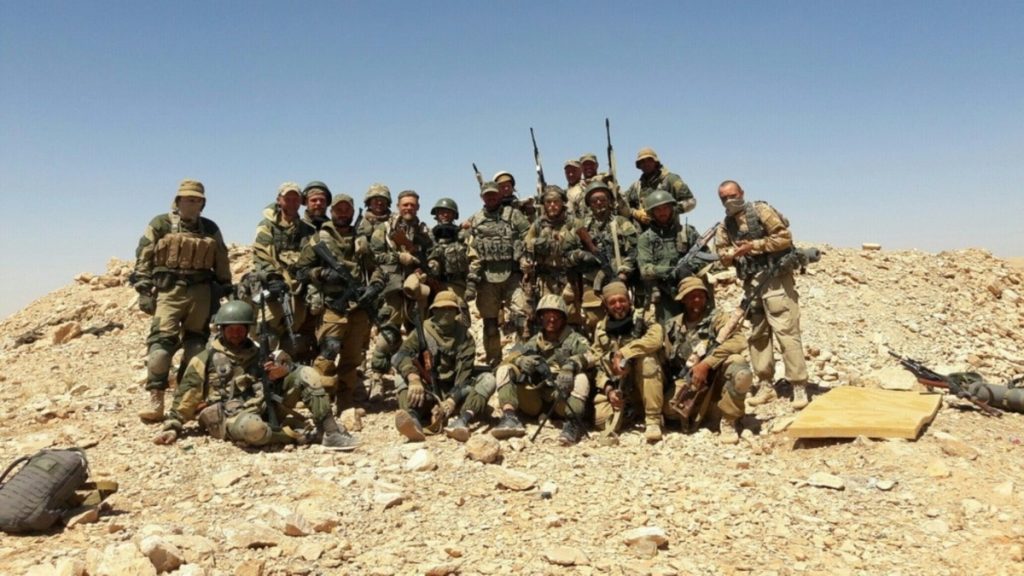
True, one of the experts questioned the Novaya Gazeta investigation:
“This may be a fake and an element of the operational game of the Russian special services against the crazed cook, whose power and capabilities have begun to raise questions and envy among the real masters of life, who, are beginning to feel the loss of face and fodder meadows, so there was a need for such an investigation, which “can be put on the table for anyone who needs it” to provoke retaliatory actions against the too powerful Prigozhin.
In 2016, Prigozhin tried to create a PMC “Raccoon” on the territory of Ukraine, headed by Roman Telenkevich. However, after a series of conflict situations, the PMC was disbanded (tentatively at the beginning of 2019).
On October 22, 2018, Novaya Gazeta came out with a revealing article, “The cook loves it spicier”, which told about a man who told how he did dirty work on the instructions of people who worked for Prigozhin, participated in attacks on oppositionists and bloggers, special operations in Russia and abroad. The man’s name was Valery Amelchenko, and he strangely disappeared immediately after meeting with the journalist – only a shoe and a mobile phone were found at the place of disappearance.
To “work” for Prigozhin, Amelchenko was attracted by an acquaintance – Andrei Mikhailov, known for provocations in 2013 against Forbes magazine, Novaya Gazeta and other publications, as well as against the writer Dmitry Bykov. The publications then advertised a non-existent politician and tried to accuse Bykov of receiving a fee for his speech. Mikhailov confirmed that he had hired Amelchenko in the past and that he worked for Prigozhin’s structures from 2012-2014.
Amelchenko said that he organised the attack on Sergei Mokhov, the husband of Lyubov Sobol, an associate of Alexei Navalny, and a young man named Oleg Simonov gave an injection, after which Sergei felt acutely unwell for some time. Amelchenko claimed that the task was not to kill but to scare Mokhov. Doctors suggested that Mokhov was injected with a psychotropic drug or neuroleptic, but it is impossible to determine it due to the rapid disintegration of the substance. Furthermore, doctors noted that it is impossible to accurately predict the effect of such a drug on the human body: with uncontrolled use, death from suffocation is also possible. Mokhov’s attacker, Oleg Simonov, died six months later under mysterious circumstances.
Amelchenko also admitted that he organised the attack on Sochi opposition blogger Anton Grishchenko in 2013.
During 2014-2016, Amelchenko and his people had to work primarily in the territory of Ukraine. Moreover, both in the self-proclaimed “LDNR” and the territories controlled by Kyiv. Amelchenko said that he “performed specific tasks on the Maidan.”
Later, Amelchenko was transferred to Syria as part of a special group. According to Amelchenko, on February 12, 2017, a group went to Syria on the instructions of Prigozhin’s security service. Their route was: by plane from St. Petersburg to Istanbul, and flight to Beirut after a few hours transfer. From Lebanon, they were escorted by Arab military vehicles to Damascus. According to Amelchenko, the group consisted of himself, Simonov, Gladienko, Sergey Kuznetsov, and Vyacheslav Vareev, who was brought to teamwork for the first time. The group was supervised by security officer Sergei Gubanov, who was travelling with them.
Gubanov, a former police officer, served in the Main Directorate of the Ministry of Internal Affairs of Russia for the North-Western Federal District. Currently, he is a member of Prigozhin’s security service (call sign “Malysh” [English “Tot” – ed.]). In addition, he is one of the founders of the League for the Protection of the Interests of Veterans of Local Wars and Military Conflicts. The co-founders of the League are one of the Wagner commanders, Hero of Russia Andrei Troshev and the general director of Euro Polis LLC, associated with Prigozhin and the Wagner group, Oleg Erokhin.
According to Amelchenko, the group’s task, which they received from the “St. Petersburg master”, is to test various drugs on members of the Islamic State and other militants captured by the Syrian army.
At the same time, journalists from Novaya Gazeta published the name of the person who led the special operations for Prigozhin. Evgeny Arkadyevich Gulyaev has been working for Yevgeny Prigozhin as the head of the security service for many years. In the past, he was an operational officer of the Leningrad and St. Petersburg police; he started at the Directorate of the Special Police Service (a unit that existed until the mid-90s and was responsible for working with foreigners). He ended his service in the Main Directorate of the Ministry of Internal Affairs for the North-Western Federal District. His role in Prigozhin’s security service is confirmed by data from the correspondence of employees of Prigozhin’s companies stolen in 2013 by Anonymous International, numerous joint trips and flights with established Prigozhin’s employees, including commanders of the Wagner Group Dmitry Utkin and Andrey Troshev.
Experts immediately pointed out that the owner of Novaya Gazeta, the all-powerful head of Rostech and Putin’s former KGB dormitory neighbour Sergey Chemezov, who has an extremely negative attitude towards Prigozhin, is behind the publication of materials against Prigozhin. Prigozhin’s attempts to send his agents to Novaya Gazeta (in 2013, the story of the so-called “Masha Hari” – a girl who worked for Prigozhin and got a job in the advertising department of Novaya Gazeta) were not successful. Chemezov answered Prigozhin asymmetrically. Hackers from the Shaltai-Boltai group, close to Rostech, opened the mail of Prigozhin and his employees and published many compromising materials.
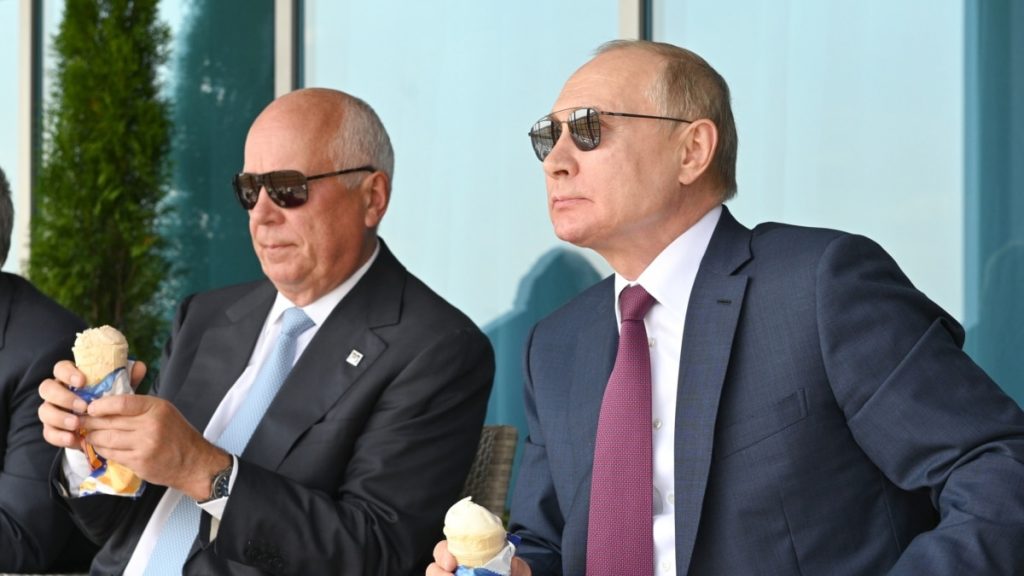
In 2019, Novaya Gazeta published the data of another hacking of materials – Prigozhin’s accounting department. Igor Mangushev, his PR specialist, gave Prigozhin a receipt for 520 thousand rubles. These are the budgets of a fake with a “signature forgery factory” for the oppositionist Lyubov Sobol and a production base for anti-Putin militants. Arseniy Shipelenko signed for 850 thousand rubles. In exchange for this money, the young politician was “disappointed in Sobol” and talked about her “dirty methods, persecution of dissenters, inhuman and consumerist attitude towards people” in front of the camera.
At the same time, Andrey Mikhailov, Prigozhin’s former close associate, said he received 7 million rubles in cash from Prigozhin for provocations against catering competitors, fake car accidents, and cockroaches planted in Samara hospitals. Mikhailov’s victims were the editor-in-chief of RIAN Svetlana Mironyuk, the liberal poet Dmitry Bykov, the sites of Novaya Gazeta, Ekho Moskvy, MK, Dozhd, and Forbes that suffered from DDoS attacks. According to the political strategist, after a quarrel with Prigozhin, he was taken to the forest, beaten, and demanded to give 3 million rubles and transfer the business to Dmitry Utkin (Wagner).
A big scandal erupted in the summer of 2018 when several Russian journalists were killed in the Central African Republic, namely military correspondent Orkhan Dzhemal, cameraman Kirill Rogov and director Alexander Rastorguev. It is known that the journalists arrived in the Central African Republic to prepare a report on the Wagner private military company operating at that time in Central African Republic.
Soon the details of the tragedy became known. It turned out that the disgraced billionaire Mikhail Khodorkovsky paid for the journalists’ business trip.
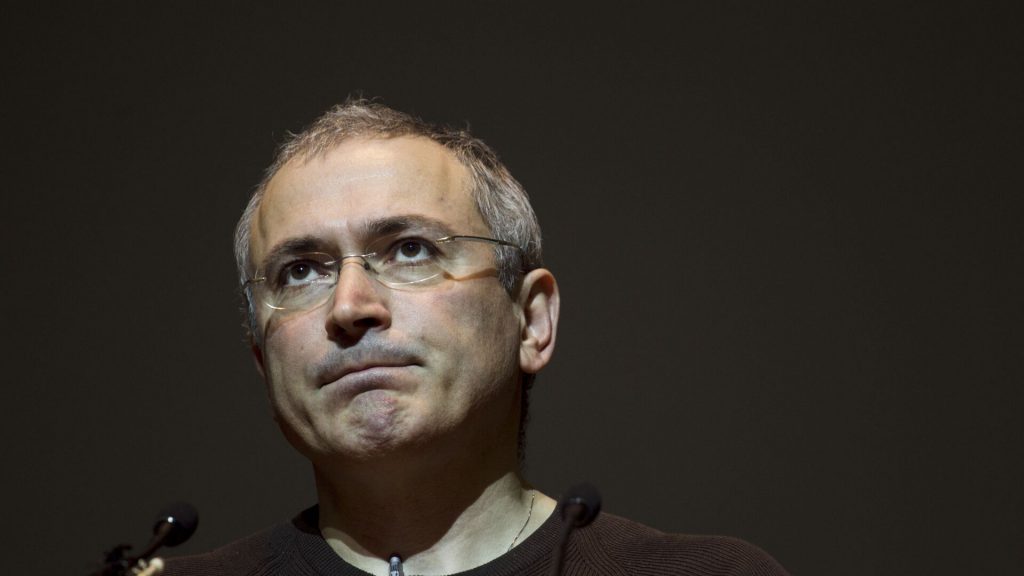
Kirill Romanovsky, who worked for him, fulfilled the order and introduced the victims to the fictional African” fixer Martin”. The movements of journalists looking for Wagner fighters in the Central African Republic were controlled by their driver Bienvenue Duvokama and gendarmerie officer Emmanuel Kotofio. On one smartphone, he posed as “Martin” via WhatsApp, oversaw the execution of the group at the murder site, and also reported to Prigozhin’s PMC instructor Alexander Sotov and his leader, “adviser to the President of the Central African Republic” Valery Zakharov. After the liquidation of the correspondents, Kotofio, earlier trained by the “Wagnerites”, was promoted. Alexander Sotov, who led the operation and is a specialist in outdoor surveillance and recruitment, guarded the casino in Petrounion guards” by Ilya Kligman. The banker Kligman was the accountant of the leader of the Tambov organised crime group, Vladimir Kumarin. The founder of the Commission on combating corruption, terrorism and extremism, “Society and Security”, Sotov received the salary of a PMC fighter number “M-5661”. He was paid by Yevgeny Prigozhin’s company M-Finance.
It also became known that Khodorkovsky, who paid for the activities of the dead journalists in Africa, was interested not only in disclosing the nuances of the activities of the Wagner PMC. First, he was interested in the company “Lobaye Invest “activities, which explores and mines gold and diamonds in the Central African Republic on 400 hectares. The director of “LI” is Evgeny Khodotov, a former St. Petersburg Regional Department employee for Combating Organised Crime.
Nonetheless, this scandal was hushed up. The topic was simply forgotten after a week of discussion on social networks and the media.
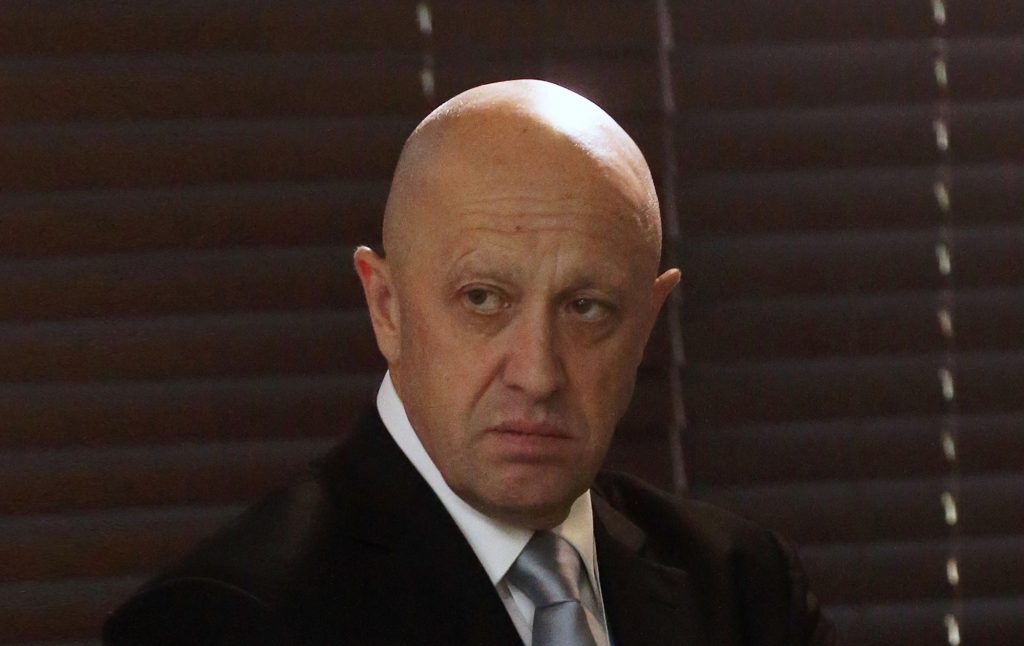
At the end of 2018, it became known that Yevgeny Prigozhin began to invest in the so-called “Pan-African project” to create a network of pro-Russian activities on the African continent. In June 2019, Prigozhin met with Putin (on the eve of the meeting of the President of the Russian Federation with 50 African leaders) and showed him a five-colour kraut of Africa, passing it off as a schedule of cooperation between the leaders of 13 countries of the African world. In addition, Prigozhin said that thanks to his efforts, Andri was elected President of Madagascar. Radzuelin (although, in reality, Prigozhin’s technologists worked for Radzuelin’s competitor, ex-Prime Minister Jean Berezika) and also spoke about investing in African media.
According to Ascolta, Yevgeny Prigozhin interfered in elections in Senegal, Rwanda and other countries, investing $15 million in Madagascar alone. The leaders of the failed “black empire” Prigozhin chose a native of the Nation of Islam movement, a European migrant, Kemi Seba, who was imprisoned in France for anti-Semitism. Dmitry Utkin (Wagner), ex-head of Rosmolodezh Sergei Belokonev, manager of the MMM pyramid Andrei Kramar, diamond dealer Vladimir Boyaryshev and a PR man working with the “leadership” of the self-proclaimed “DNR” Roman Pozdnyakov were engaged in this direction with zero practical effect. Since Prigozhin had previously failed absolutely all the programs entrusted to him, the money was gone. Hence, the conquest of Africa did not happen.
In January 2019, Prigozhin flew to the Central African Republic and took part in negotiations between the authorities and the armed opposition. But, unfortunately, the negotiations ended with the signing of an armistice.
In May 2019, Russian President Vladimir Putin and Congolese President Denis Sassou Nguesso agreed at talks in Moscow to send Russian troops to the Congo. The parties also agreed on the supply of Russian weapons. “We expect to receive requests for the supply of new equipment. It is necessary,” the Kremlin said. In addition, the parties signed several more agreements, particularly a protocol of intent between LUKOIL and the State Oil Company of the Congo. Yevgeny Prigozhin had a strong interest in the Republic of the Congo.
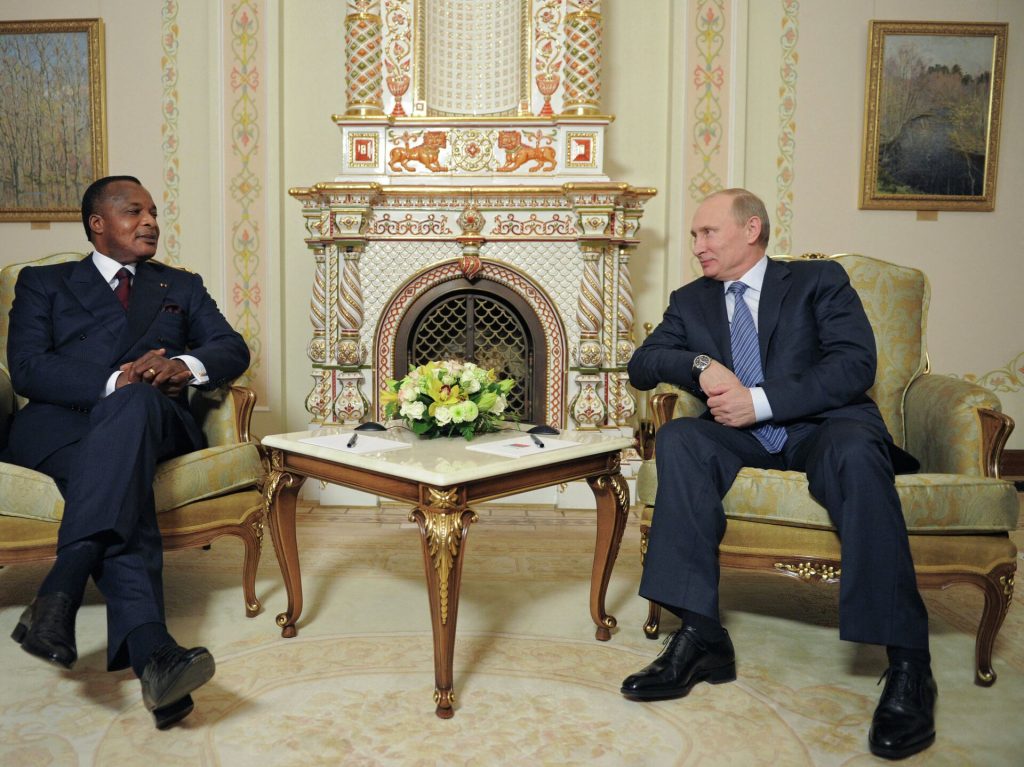
In March 2020, CNN found another Russian troll factory, this time in African Ghana, influencing Americans ahead of the US presidential election. The “trolls”, as usual, sowed mutual enmity among Americans, incited racism and even called for the assassination of a US senator. CNN linked this “troll factory” to Prigozhin’s activities.
Documents show that Prigozhin’s team, led by political strategist Maxim Shugalei, worked with Seif al-Islam Gaddafi, the son of the assassinated Libyan leader Muammar Gaddafi. A plan was agreed upon for the victory of the Gaddafis in the local civil war. According to Prigozhin, the defeat of enemies should have been ensured by the publication of comics, the promotion of fake likes on Facebook, the creation of the Gaddafi Public Chamber, the institution of Libyan federal plenipotentiaries and the Libyan version of the All-Russian People Front. From the hacked correspondence between Prigozhin and Shugalei, it follows that in the city of Benghazi, with the permission of Field Marshal Khalifa Haftar, a secret Russian military base is operating. The Ukrainian company “Europe Air” delivers spare parts for tanks, infantry fighting vehicles and armoured personnel carriers. Its owner is Jaideepa Mirchandani, an Indian-born Russian-speaking resident of the United Arab Emirates. In response to the hospitality of Haftar, loyal to Moscow, Shugalei’s people plotted against him and threw in a video with compromising personal evidence. Yevgeny Prigozhin controlled the wards by phone, poorly protected communications and servers open to hacking. Therefore, any secret trusted by “Putin’s chef” immediately became known to foreign intelligence agencies – both state and private.
After the scandal, Maxim Shugalei (who previously worked in the presidential elections in Madagascar) was arrested by Haftar’s special services and thrown into prison.
At the same time, it became known that Prigozhin sent two Mi-8T helicopters, 20 Ural-4230 military trucks, 72 PUS-1 police batons, and half a ton of Sturm 3 protective shields through a fictitious address in Florida. Amongst the recipients, there were “Lobaye Invest” and “Meroe Gold” of Mikhail Potepkin, the ex- “commissar” of the pro-Putin movement “Nashi”.
At the end of 2019, it was reported that Yevgeny Prigozhin would help the ruling party of South Africa defeat the opposition in the elections. Employees of “Putin’s chef” Afanasyev, Bychkov, Syty, and Darovskaya discredit the opponents of the African National Congress with posters, graffiti, cartoons, cartoons and fakes on the Internet.
In April 2019, a military coup in Sudan overthrew President Somar al-Bashir, with whom Prigozhin had more than close ties. It was through Prigozhin that Russia invested huge amounts of money in Sudan. There were also problems with PMC “Wagner” financing and supply in the Central African Republic – earlier assistance went through the Sudanese line.
On July 26, 2013, Evgeny Prigozhin created the Internet Research Agency. According to reports from the Center for the Study of Computer Propaganda at Oxford University, Prigozhin and his team began experimenting with social media campaigning during the 2009 elections. The agency became known to the general public in September 2013 after an investigation by Novaya Gazeta called “Where the trolls live. And who feeds them”, where the term “troll factory” was first used. Later, this name was widely disseminated in the media and was assigned to the “Internet Research Agency”. The organisation’s founder was Mikhail Kurkin, the general director was Nikolai Chumakov, and offices were opened in Moscow and St. Petersburg. The St. Petersburg office was located in the Olgino district, which gave rise to another common name – “Olginsky trolls”. Corporate correspondence of the agency, published in 2014 by the Shaltai-Boltai hacker group, indicated that the firm was supported by companies close to Prigozhin and profited from contracts for the Russian Ministry of Defense.
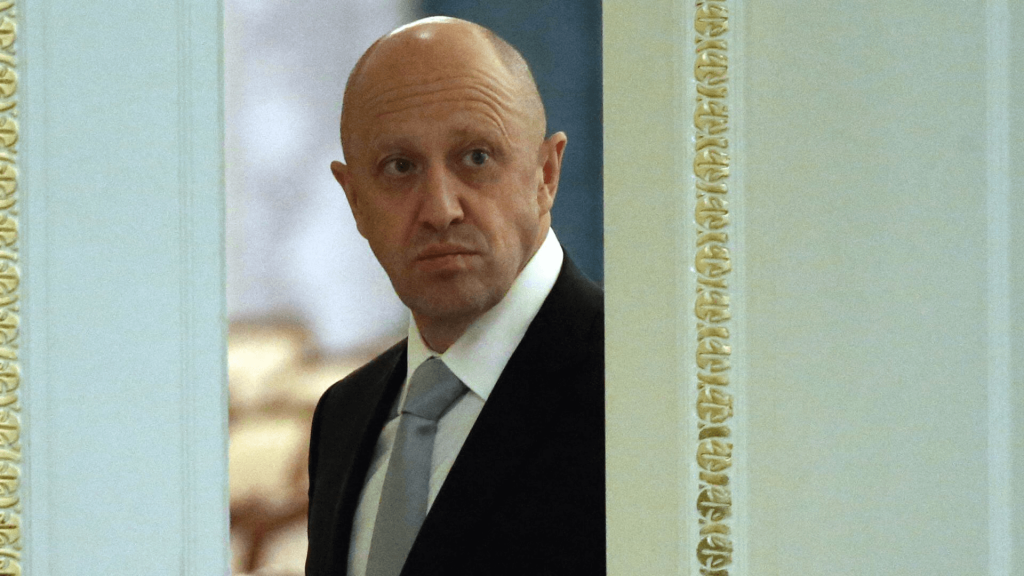
The American special prosecutor Robert Muller pointed out that in 2016 the organisation was headed by Mikhail Bystrov and Mikhail Burchik, and the operational department of the foreign department was led by Jeyhun Aslanov, who was also the founder of the Azimut and Reputation Management Center companies. Aslanov was included in the US sanctions list for his work at the Agency. According to a source on the Dozhd TV channel, Katarina Aistova, who was responsible for current management and through two managers on duty, was directly subordinate to him. The founder of RIA FAN (Federal News Agency), Yevgeny Zubarev, and ideologist Andrei Mikhailov are also associated with the company’s activities, who, as Novaya Gazeta noted, gained fame in 2013 thanks to provocations against writer Dmitry Bykov, Forbes magazine, and Novaya Gazeta itself as well as many other periodicals. All of them denied their involvement or ignored the requests of journalists.
In 2019, the Russian social network VKontakte began cleaning up fake accounts to eliminate the “litter” of the public.
According to former employees, in 2017, the company employed about 400 people who daily commented on posts on LiveJournal, Twitter, Facebook, YouTube, Russian-language liberal media and city forums, as well as filmed staged videos and rewrote news. In addition, a former employee said the agency received topics directly from the Kremlin. However, presidential spokesman Dmitry Peskov called these claims “speculation” in 2019.
Over a 12-hour shift, employees posted an average of 135-141 comments on a given topic, each containing at least 200 characters. The Internet Research Agency had a rigid hierarchical structure: copywriters only contacted their immediate superior and did not know the top management. Cameras were installed in the offices, access control was in effect, employees were checked on a lie detector, and the pages of employees on social networks were scanned. Regular ideological examinations were held among staff, and fines and dismissals were common for belief inconsistencies. The average starting salary with bonuses in the Russian department was about 45 thousand rubles; in the American department – 50-60 thousand rubles.
In 2015, Lyudmila Savchuk, a former employee of the Agency, filed a lawsuit due to the lack of an official employment contract, a dismissal order, and non-payment of salaries. In August 2015, the court granted her claim. Commenting on the outcome of the lawsuit for DW, Lyudmila Savchuk expressed her satisfaction that she “had brought these people into the public space” and stated that she was able to “legally prove the existence of the ‘troll factory’ and their work to produce paid comments.”
In October 2019, at the request of the United States, an employee of the Internet Research Agency Yevgenia Prigozhina, an activist of the “troll factory” Anna Bogacheva (“Anna Trigga”), was arrested and released in Belarus. Earlier, she was a comrade-in-arms of the ideologist of the Combat Organization of Russian Nationalists, Ilya Goryachev, convicted of murder. In addition, Bogacheva was a student of the agent Maria Butina, earlier arrested by the Americans (for the maintenance of whose lawyers Prigozhin allocated $5 million).
Later details of a cyber attack on Yevgeny Prigozhin’s “troll factory” became known. His employee opened a file that came from an unknown email. The attachment contained a virus that gave the Americans control over their computer and office Wi-Fi. Prigozhin’s subordinate connected his infected iPhone to an intranet. This allowed the US intelligence services to seize the local network of the “troll factory”.
Similarly, electronic media has been hacked more than five times. Full access to the closed archives of PMC “Wagner”, RIA FAN, and project “Lakhta “, including files erased by the owners, have dozens of private and government hacking customers in different countries worldwide. This compromised any secret that was trusted to Yevgeny Prigozhin. And yet he remains one of the most trusted persons of V. Putin.
So it became known that Prigozhin received full reports on meeting Putin with high-ranking guests from abroad – down to the details of informal negotiations.
Also, Prigozhin’s subordinates posted on the Web scans of the pages of the diary as if belonging to him. It is scheduled there when the businessman has meetings with the head of the Presidential Administration, Anton Vaino, when – Sergei Shoigu, with other ministers and simply important people. Often with cell phones of the latter. The mailboxes of ordinary security personnel were also hacked – and the materials contained there describe in detail how a friendly service industry enterprise conducts reconnaissance actions and even prepares for military operations.
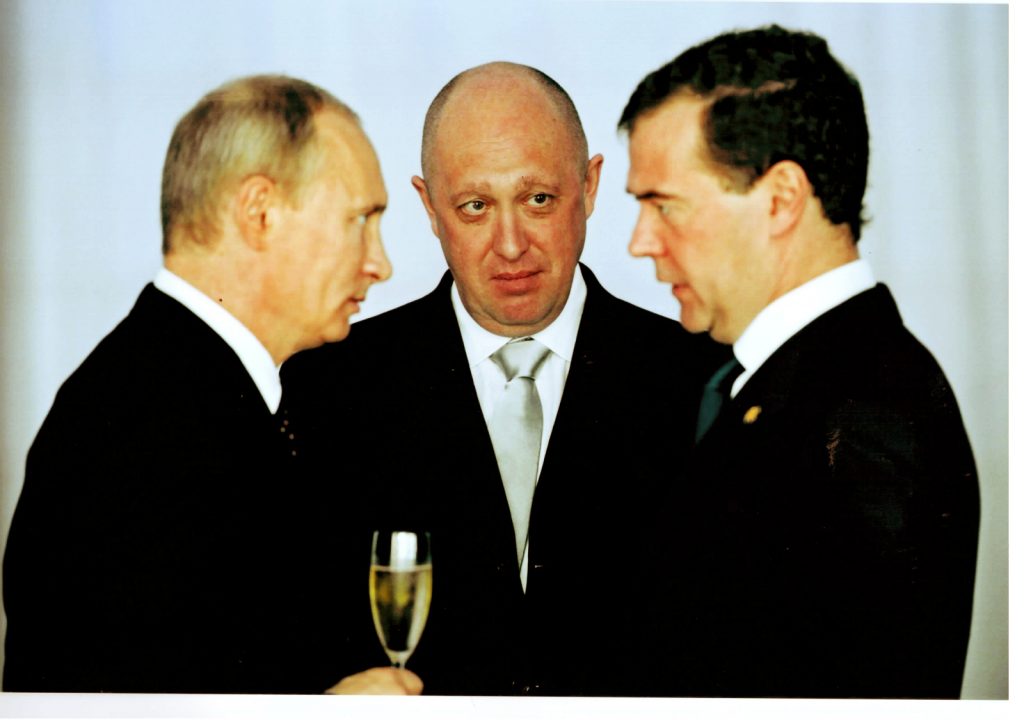
In May 2014, Yevgeny Prigozhin founded his own media holding named the Federal News Agency. Evgeny Zubarev, who previously worked at Rosbalt, became the CEO of the holding. The top manager of RIA, Novosti Vladislav Krainem, became the editor-in-chief; a little later, he was replaced by Evgeny Dabizha. The newspaper’s editorial office is located in St. Petersburg, on Savushkina Street, 55. Prigozhin’s “troll factory” was located at the same address.
According to RBC’s investigation, the “media factory” includes at least 16 publications, nine of which are officially registered by Roskomnadzor [Russian federal executive agency responsible for monitoring, controlling and censoring Russian mass media – ed.] as mass media. The largest project is the Federal News Agency, which is closely associated with it:
- “Economy Today”
- “People’s News”
- “Politics Today”
- “KyivSMI”
- “New Inform”
- “PolitExpert”
- “Nevsky News”
- “Kharkiv News Agency”
- “Informator”
- “Journalistic Truth”
- “PolitRussia”
- “Slovo i Delo”
- “PolitPuzzle”
- “Who is who”
The holding does not have a single legal entity, although some news agencies are referred to as those having the same founders. For Inforeactor, PolitExpert, and Newinform, it was the Novinfo publishing house owned by businessman Yuri Krasnov (since January 15, 2018, the Niolapress company). Federal News Agency LLC, owned by Aspect Joint-Stock Company since 2018, holds the Politics Today, Free Time, Journalistic Truth, Economics Today, and Federal Incident Agency portals. Until January 15, 2018, RIA FAN also belonged to the publishing house; later, the Informburo news agency was listed as its founder. The founder of the PolitPuzzle platform, Vladimir Mezentsev, declared “Slovo i Delo” newspaper his project.
Since 2015, RIA FAN, Politika Segodnya, Ekonomika Segodnya and Narodnye Novosti have all been located at the same address. In 2016, Aleksey Nikiforov, who previously managed the Spetsstroyproekt metalwork manufacturing company, became their de facto general manager. Another part of the holding, located on Savushkina Street, was controlled by Oleg Vasiliev, presumably a former “troll factory” employee. Businessman Mikhail Burchik is also called one of the leaders of the holding. The organisation’s funding sources are unknown, probably the investments of Yevgeny Prigozhin’s business structure. However, the entrepreneur did not officially confirm his involvement. According to various estimates, media content costs 15-22 million rubles a month.
On October 1, 2019, The Federal News Agency and Politika Segodnya, Ekonomika Segodnya and Nation News announced the creation of a united media group, “Patriot”. The total monthly audience of portals exceeds 26 million people. The purpose of cooperation will be forming a “favourable information space” and coverage of events in the country. Yevgeny Prigozhin will head the board of trustees of the new holding, and the company’s office will occupy part of the Lakhta Plaza residential complex, the developer of which is the Concord Management and Consulting corporation owned by the entrepreneur.
A former employee of the “Fabrika” and the organiser of provocations, Andrei Mikhailov, pointed out that the topics of publications were selected randomly. Geopolitical conflicts and Russia’s foreign policy are covered by: “Politics Today”, “PolitExpert “, “Slovo i Delo”, “PolitPuzzle “, “Journalistic Truth”; “Kharkiv News Agency “, “KyivSMI “, are dedicated to the events in Ukraine; the newspaper “Economy Today” surveys business news. The media from the media group were repeatedly accused of spreading false information.
The Federal News Agency is focused on the national agenda and publishes materials that support Russia’s foreign policy. Journalists of the newspaper reported on their pro-Kremlin PR activities.
Since 2015, RIA FAN reporters have been covering the fighting in Syria on a full scale. To do this, they received accreditation through the local Ministry of Information and the Ministry of Defense, rarely in contact with the command of the Russian Armed Forces. This allows reviewers to stay ahead of peers in other media. For example, in March 2017, journalists entered the re-liberated Palmyra together with the Syrian military. Presumably, the success of the Syrian campaign of the publication is also due to the newspaper’s ties with the Wagner PMC. Although RIA FAN correspondent Kirill Romanovsky denied contact with this formation, according to RBC, other Russian PMCs could assist. In 2018, a month after the death of three Russian journalists in the Central African Republic, a collaborative group of journalists from RIA FAN and Fontanka.ru went to the Central African Republic and repeated the route of those killed. The trip’s official purpose is to “understand the country’s economic, social and political situation.”
In April 2018, a subsidiary project, “USA Really “, was launched, publishing content aimed at highlighting political, cultural and racial contradictions in the United States. Shortly after creating the portal, the US Department of the Treasury placed it on the sanctions list. In addition, the publications of the websites “Journalistic Truth”, “RIA FAN”, and “People’s News” are recognised as propaganda. Having failed all the instructions and, due to his own short-sightedness, handing over the secrets entrusted to him to the US intelligence services, Prigozhin promised the president to defeat the Moscow protests with the help of a fake letter from the TFR thanking the Dozhd channel.
In October 2017, after the publication of an investigation by RBC about the connection of the “troll factory” with Prigozhin’s structures, the news aggregator Google News “stopped broadcasting RIA FAN materials and deleted already published ones. To resolve the conflict, the newspaper’s management turned to Roskomnadzor, and eight days later, the information resource account was restored. In April 2018, Facebook blocked 270 accounts and pages associated with the “troll factory” and “RIA FAN”. In response, the publication sued the social network for violating the law on freedom of speech and discriminating against the newspaper “based on national origin”, but the lawsuit was dismissed.
In October 2018, the US Department of Justice charged Yelena Khusyainova, the newspaper’s chief accountant, with organising and financing a conspiracy to interfere in the 2016 US election. According to the case materials, Federal News Agency LLC participated in the Lakhta project to misinform American citizens. In December, the US Treasury Department placed FAN on the Specially Designated Nationals List. After it, Yevgeny Prigozhin announced his intention to support the media, although he emphasised his innocence.
In August 2019, RIA FAN and three publications related to it were added to the Russian Wikipedia spam list as sources of political disinformation. Thus, the newspaper materials were used by a group of 12 editors of the free encyclopedia to substantiate edits aimed at discrediting the opposition and glorifying the authorities. In response, the publication released a commentary by the head of the RIA FAN project, Yevgeny Zubarev, that “Wikipedia recognised the obvious and earlier fact that it is a propaganda tool on the part of the United States,” as well as news with comments from State Duma deputy Mikhail Yemelyanov, in which he stated that such the decision is “an act of political censorship by the West”.
In December 2019, Novaya Gazeta published papers from which it follows that a provocation was organised to use RIA FAN to accuse opposition candidates in the elections to the Moscow City Duma of falsifying signatures for them.
In 2022, with the start of a full-scale invasion of Russian troops on the territory of Ukraine, Prigozhin’s media holding placed great emphasis on forming its pool of war correspondents and Telegram channels that provide the most up-to-date information from the front, receiving exclusive content from the hottest spots. Of the most famous Telegram channels included in the Prigozhin media holding: “Unloading Wagner”, “Operation Z: Russian Spring military commissars”, “Turned on the Z war”, “Sentry Z”, “Grey Zone “, “Russian Spring Z”, and others. Prigozhin also uses the personalised Telegram channel “Prigozhin’s Cap” to publish statements and respond to media inquiries.
Notably, the “Prigozhin” media are increasingly becoming the primary sources of information from the combat zone for the Western and Ukrainian media. At the same time, the information agenda in the press of Prigozhin and the national media in Russia is fundamentally different.
There was a blast on April 2, 2023, at the “Street Cafe Food Bar No. 1” on the University embankment of St. Petersburg. Later it turned out that in this institution, which also belongs to Prigozhin, an event was held by activists of the Russian patriotic organisation Cyber Front Z, at which one of the most famous Russian military correspondents Maxim Fomin, better known under the pseudonym Vladlen Tatarsky, spoke. Recently, Tatarsky has been noted for his sharp criticism of the military leadership of the Russian Federation and public support for Prigozhin. Later it became known that one of the participants in the event, as a gift for Tatarov, brought a figurine in which explosives were hidden. Unfortunately, as a result of the explosion, Tatarsky died. Sometime later, Yevgeny Prigozhin visited the cafe in which the blast occurred and held a press conference, sitting in the same place where Tatarsky had previously sat.
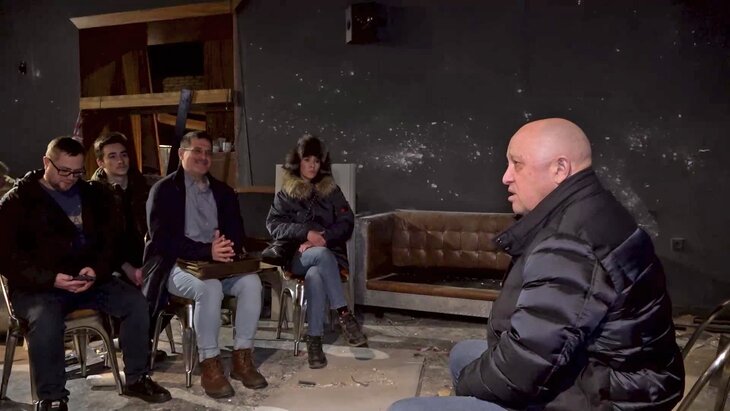
On December 20, 2016, Yevgeny Prigozhin was included in the US sanctions list, introduced due to Russia’s role in the war in Ukraine. Commenting on this decision, Prigozhin noted that he is indifferent to the sanctions since his business is not connected with Europe and the United States and prefers to rest in Russia. In June 2017, the extended sanctions list included Concord Catering and Concord Management and Consulting, the managing company of the Concord holding, which includes several restaurants and the Chocolate Museum chain of boutiques. On February 16, 2018, US Special Counsel Robert Mueller indicted Yevgeny Prigozhin and 12 other Russian citizens in a case of interference in the US presidential election.
In March 2018, Bloomberg published data on Prigozhin’s financing of environmental protests in the United States. Through a campaign on Instagram, FB and Twitter, the restaurateur tried to prevent the export of American shale oil through the DAPL pipeline and government support for electric vehicles. Detailed testimony against his employer, Yevgeny Prigozhin, on whose order the USA Realii project was edited, was given to the US FBI by the first producer Alexander Malkevich, who was detained at the Washington airport.
At the same time, the US government accused Prigozhin’s employee Elena Khusyainova of interfering in future congressional elections. Petersburger Elena Khusyainova was an accountant for the Lakhta project, a “troll factory” on FB, Twitter, Instagram and VK. The Americans revealed the shareholder’s mobile phones and obtained Lakhta’s secret documentation, including propaganda budgets, instructions for processing members of sexual minorities, and reports from fake social media accounts.
As a result, the US Department of the Treasury imposed sanctions on the yacht “Saint Vitamin” and private jets of Evgeny Prigozhin – Embraer 135, British Aerospace 125 and Hawker 800XP. Prigozhin does not use domestic airliners because he does not believe in their reliability.
Vladimir Putin compensated Yevgeny Prigozhin for turning off the Internet and the US intelligence services problems. During the American special operation, Prigozhin was left without office communications for one day. As a result, he received 5393 state shock contracts for 209 billion rubles. Prigozhin’s companies also received new contracts from Defense Minister Sergei Shoigu. We mean about 585 million rubles for servicing military units in South Ossetia, Kyrgyzstan and Armenia.
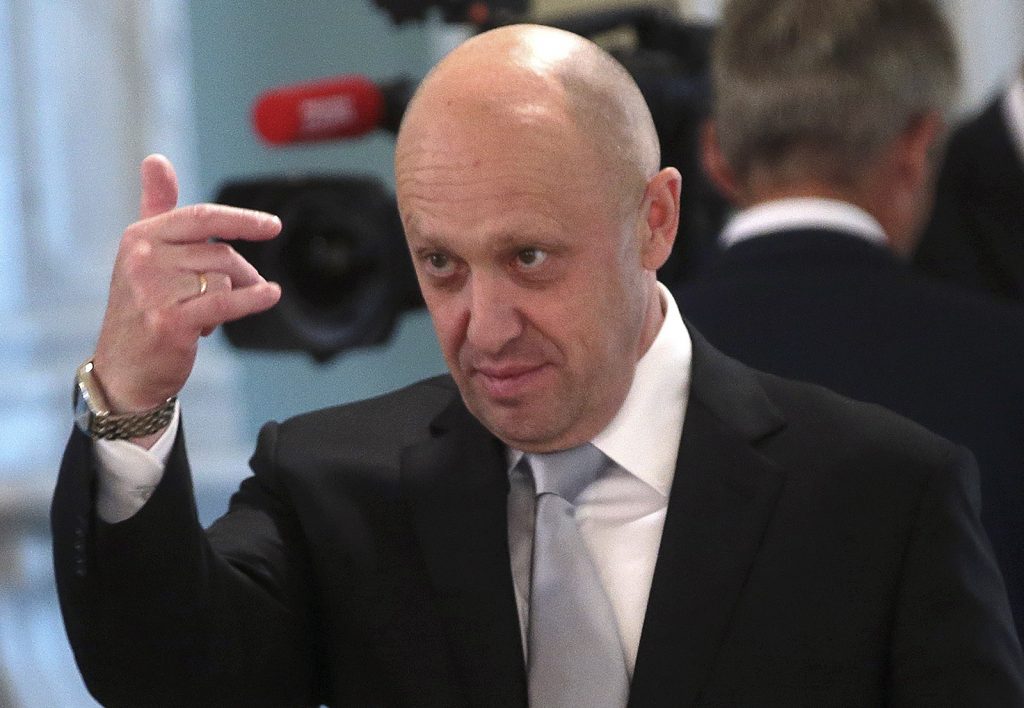
Prigozhin, in response to the sanctions, promised to “blow up America” by building a Pan-African state instead. Prigozhin even began to budget for the destruction of the United States, trying to convince Putin of the combat training of African Americans and the coming riots in Alabama, Georgia, South Carolina, Mississippi and Louisiana. The project was entrusted to the Azerbaijani migrant Jeyhun Nasimi only Aslanov and his wife, the daughter of a Yedinaya Rossiya official Daria Timoshenkova-Aslanova (soon, criminal cases were initiated against Aslanov and 11 of his employees in the United States).
In September 2019, key members of Yevgeny Prigozhin’s team developed for the Kremlin and have already submitted the concept of party reform to the leadership of the presidential administration. The essence of the Prigozhinites’ proposal: Yedinaya Rossiya should be liquidated, and two other parties should be created instead: a liberal and a conservative-patriotic one. This is necessary to solve the problem of the decreased rating of the party in power. Furthermore, the authors proposed to carry out the reform quickly; according to their plan, the current Yedinaya Rossiya General Council secretary, Andrey Turchak, should soon become the “chairman of the liquidation commission.”
The document, in which the authors of the idea described the ideology of the conservative-patriotic party, states that Russia’s mission is to preserve peace on the planet, regardless of state borders. And the potential party puts the state’s interests at the forefront, which should be guided by officials (not to live abroad), people in business (to be helpful) and citizens to the best of their ability.
“Prigozhinites” presented their proposals to the head of the presidential administration, Anton Vaino, who accepted them in August 2019 in his office. Among the participants of the meeting were Prigozhin’s main employees, who, among other things, were involved in the projects of the “cook” in Africa: the head of the back office, Petr Bychkov, and political strategist Igor Osadchy. How Vaino reacted to the presentation is not known.
However, in March 2020, it suddenly became known about the political union of the former assistant to the President of the Russian Federation, Vladislav Surkov and the “Orthodox billionaire” Konstantin Malofeev. This union echoed the main provisions of Prigozhin’s conservative-patriotic project.
At the beginning of 2020, the Telegram channel “Kremlin crazy man” wrote sarcastically:
“At the end of 2019, the results of the report on the “peace index” were published: another rating in which Russia is moving down. In particular, the document states that the level of trust in the leadership of Russia is falling in the Russian Federation, the Eurasian region, and sub-Saharan Africa. By an amazing coincidence, these are the regions of the world where Olga Prigozhin’s bot farm (whose attempts to “influence Trump’s election”, including those recorded in the Mueller report, gave rise to the most stringent package of sanctions to date). Of course, other of its structures also contribute (PMCs, investment firms, groups of drunken regional political technologists in pursuit of a long Madagascar ariary and so on). But the level of trust in the leadership of Russia in Mongolia has grown. But, unfortunately, Prigozhin’s people don’t know how to speak Mongolian.”
On October 11, 2019, it was reported that the plane with Yevgeny Prigozhin on board crashed in Africa in the Democratic Republic of the Congo. True, the information was unreliable: the aircraft belonged to Prigozhin’s company, but Prigozhin himself was not on board.
On January 10, 2020, German magazine Zuerst! reported, citing Russian sources, that around 11:00 local time, Prigozhin was allegedly detained after arriving at Munich airport on flight SU 6657 of the Russian Aeroflot airline from St. Petersburg. The publication did not provide any other information. Later, a posting posted on the Zuerst! under the heading “Influential Russian Businessman Arrested at Munich Airport” became inaccessible for reading. On January 10, Aeroflot’s regular flight arrived in Munich at 11:20 local time, following the schedule. The press service of the federal police at the Munich International Airport did not confirm the information about the possible detention of Prigozhin. Christian Press Officer Keglmeier, in a comment to DW, refuted the statement that had been made public earlier in Zuerst!.
Starting in 2020, Prigozhin has focused on domestic Russian political issues. In parallel, this resulted in a cut in the budget funds received by Prigozhin’s structures. In this regard, one of the experts wrote:
“It is fortunate that the Presidential Administration, following the results of recent events, decided to refuse Prigozhin to receive “grey” government contracts. However, we won’t be surprised if the UZKS FSB is interested in him, finally. It would be high time: for public opinion inside Russia, Prigozhin’s and Malofeev’s are the two main irritants.”
In 2020, Prigozhin began investing in the educational project “School of a Young Politician” (project manager – Ilya Kostunov ). It was announced that about 1,500 future politicians should go through the school.
For some time, the governor of St. Petersburg, Alexander Beglov, was named among Prigozhin’s inner circle (Prigozhin led part of his election campaign, which was led by the political strategist of the “cook” Dmitry Kovalev). The media wrote that Prigozhin has a close relationship with the Patriarch of the Russian Orthodox Church, Kirill, and generously donates to the construction of churches. Also, the founder of Yedinaya Rossiya, Alexander Karelin, and General Vladimir Shamanov was seen on friendly terms with Prigozhin. Furthermore, Prigozhin has close contact with the head of Rosneft, Igor Sechin (who defends the “cook” from Vladimir Putin’s wrath and Sergei Chemezov’s intrigues). Prigozhin and Sechin have a common interest (oil). Interestingly, Rosneft employee Olga Shokina, who brought Igor Sechin’s “basket of sausages” to ex-Minister of Economic Development Alexei Ulyukaev, which was the reason for the arrest of the minister, headed the Concorde holding for ten years.
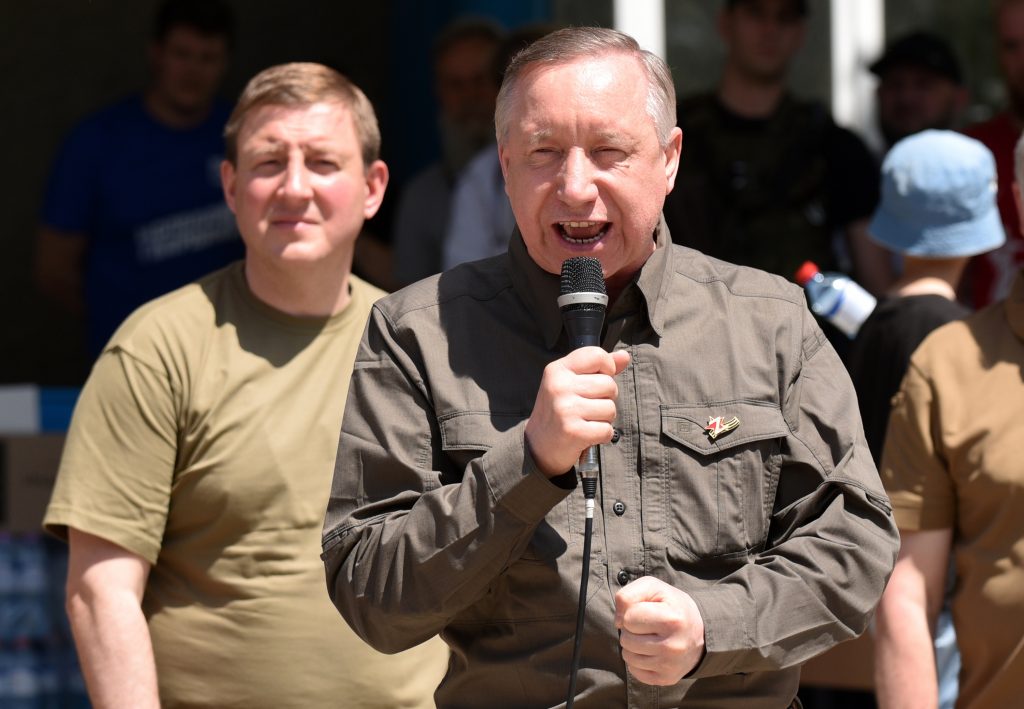
In 2021, information appeared that a conflict broke out between Prigozhin and Beglov. In August 2021, the Nezygar telegram channel wrote:
“In St. Petersburg, the conflict between Beglov and Prigozhin has entered an active form and will require the intervention of the federal centre. As they say, on the side of Prigozhin is supposedly Valentina Matvienko, who is highly dissatisfied with the actions of Beglov. Matvienko was subjected to unexpected criticism from Just Russia’s former speaker and leader, Mironov.
After some time, this conflict began to manifest itself in the public plane actively. On July 5, 2022, Yevgeny Prigozhin complained that the St. Petersburg administration terminated the contract with his company for the development of the Gorskaya territory in Lisy Nos, where a tourist zone was supposed to appear: “I spent a lot of money on this, attracted foreign companies that agreed to work with me, despite all the sanctions pressure” – said the curator of PMC “Wagner” – “My company signed an investment agreement with Beglov at the 2021 economic forum, about which he wiped his feet as a result. “
As a result, structures close to Gazprom took up the development of Gorskaya. According to the city authorities, the territory was supposed to become a tourist area, and a company associated with Prigozhin allegedly began building production sites there, so cooperation with it was terminated.
In early November, Yevgeny Prigozhin told the Prosecutor General’s Office that the governor of St. Petersburg, Alexander Beglov, “created a criminal community to plunder the state budget” and later asked the speaker of the State Duma of the Russian Federation, Vyacheslav Volodin, to especially send an emergency commission to St. Petersburg to sort out the current anti-state and anti-Russian situation.
Many analysts perceived such attacks on Beglov as the beginning of a conflict between Yevgeny Prigozhin and Yuri Kovalchuk, whose orbit of influence includes both Beglov himself and several of the main processes in St. Petersburg.
In October 2022, the opening of the PMC Wagner Center took place in St. Petersburg. Prigozhin states, “This is a complex of buildings, which contains places for free accommodation of inventors, designers, IT specialists, experimental production and start-up spaces. The mission of PMC Wagner Center is to provide a comfortable environment for generating new ideas to increase Russia’s defence capability, including information. Furthermore, in March 2023, based on the PMC Wagner Center, the Wagnerenok Youth patriotic club was opened, the officially declared goal of which is “to instil in the younger generation a love for their Fatherland.”
Already at the beginning of March 2023, Yevgeny Prigozhin resumed public attacks on Beglov and called on the residents of St. Petersburg to go to a rally against the local authorities:
“In St. Petersburg, everyone needs to transfer to an infantry fighting vehicle, or, finally, drive out the governor with a bad broom … We slipped him, and we have been sitting, for almost four years, we have been enduring this lawlessness,” said Prigozhin.
Starting from April 2023, Yevgeny Prigozhin increasingly begins to try on the image of a politician. His harsh remarks about the military leadership of the Russian Federation are increasingly regarded as an attempt to form the perception of the leader of the “party of war” and lead the movement of the most radical supporters of military operations “to the bitter end.”
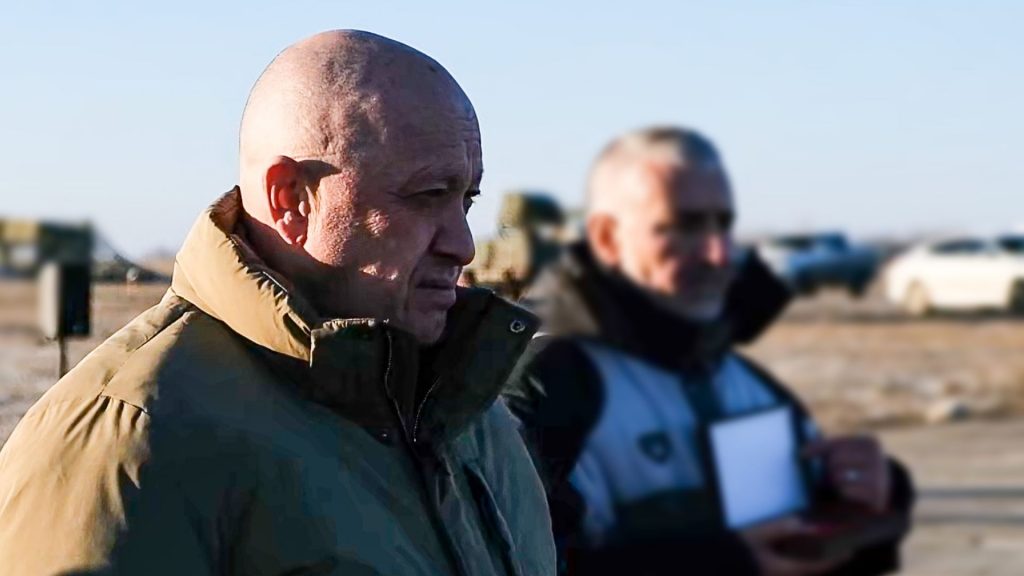
Prigozhin is proud of his close acquaintance with outstanding people and with the powers that be. In an interview, he recalled:
“Somehow, at the birthday party of Mstislav Rostropovich in Buckingham Palace, he met a cool guy, they drank decently, even though it’s strictly forbidden to smoke there, he lit a cigar. And then Galina Vishnevskaya asks me: “Do you know who this is?” I say: “Of course, it is Juanito “. She replied: “This is the king of Spain.” I can talk about Rostropovich for hours; he is a lively, simple person; I am very much indebted to him. Then, somehow he approaches the Queen of Sweden: “Hi, Ilya, I want to introduce you – this is Zhenya.”
At the same time, he tries to demonstrate ostentatious asceticism for appearances:
“Life is such an exciting thing that it’s not a matter of status. I am comfortable with asceticism; why the hell are you constantly changing cars, even if you can?”
Prigozhin’s wife, Lyubov Valentinovna, was born on June 26, 1970; she is a businesswoman — the owner of Alpha LLC and Beta LLC and co-owner of the Lakhta-Park Hotel. Also, Lyubov Prigozhina is the founder of the “Come and See” charitable foundation, which cooperates on many projects with the Russian Orthodox Church. Prigogina also owns the Crystal Spa & Lounge, where, as the brochures say, “the aura is analysed professionally.” A woman magician (as Lyubov Prigozhina positions herself) uses the energy of the ancient Egyptian god Ra. Lyubov Prigozhina suppresses negative energy with the help of crystals, which UFO specialist Valery Uvarov installed into the walls of the building for $500,000. Psychic Uvarov scans mummies and trades in energy pyramids while working with the family. As a result of their cooperation, Crystal Spa & Lounge received 36 million rubles in losses.
At the end of 2019, information appeared that Prigozhin had begun divorce proceedings with Lyubov and was going to marry 27-year-old Ekaterina Roslikova, a lawyer and a native of the city of Tomsk. The GAS system “Vybory” indicates that Ekaterina Roslikova was nominated for the election of the Tomsk City Duma. The candidate’s questionnaire demonstrates that she is a leading employee of the Tomsk branch of the LDPR and an assistant to a deputy from this party in the Legislative Assembly of the Tomsk Region. In 2017, Ekaterina left for St. Petersburg, where she became a lawyer for the Megaline company, owned by Prigozhin. On October 30, 2019, Roslikova owned a 50% stake in Prigozhin’s main asset – the Concord Food Plant.
Prigozhin’s daughter, Polina, born in 1993, ran the Polina equestrian club Prigozhina sport horses management GmbH. The company was registered in May 2012 and liquidated in May 2014; its capital was 25 thousand euros. At the same address, there is now an equestrian club named PSV Meissendorf eV., founded in 2017, where you can take riding lessons for children.
Polina Prigozhina has been involved in equestrian sports since she was eleven, the Nevsky Sport portal wrote earlier. According to Equestrian.ru, she is a candidate for a master of sports and regularly competes in competitions, including in the Netherlands, Spain and Slovakia.
In Russia, Polina Prigozhina joined the family business last year. Since August 2019, she has owned 10% of Lakhta Plaza LLC, and another 90% belongs to Lyubov Prigozhina. “Lakhta-Plaza” is a complex of business apartments located near the Primorskoye Highway in St. Petersburg.
Furthermore, in December last year, Polina Prigozhina, instead of Lyubov Prigozhina, became the sole owner of Kredo LLC, which leases and manages non-residential real estate, with a net profit of 75 million rubles in 2018. This company is the primary founder of Heritage Preservation Fund LLC (engaged in “capital investment in authorised capital and venture investment”) and Bar Service LLC (engaged in confectionery trade).
Prigozhin’s son, Pavel, born in 1996, is preparing to inherit his father’s business. The moment he graduated from one of the prestigious Western universities. On December 18, 2016, Pavel had an accident in St. Petersburg: he crashed a Mercedes Gelandewagen worth at least 12 million rubles. The car was purchased just 48 hours before the accident at the Avangard car dealership of hockey player Maxim Sushinsky. The company is known for supplying spare parts to the garages of the Federal Security Service. Pavel was not seen in other scandals; he is characterised as a calm and modest young man, the complete opposite of his father.
In 2003, Yevgeny Prigozhin and his older children Pavel and Polina wrote a book of fairy tales, “Indraguzik “, and published 1000 copies.

